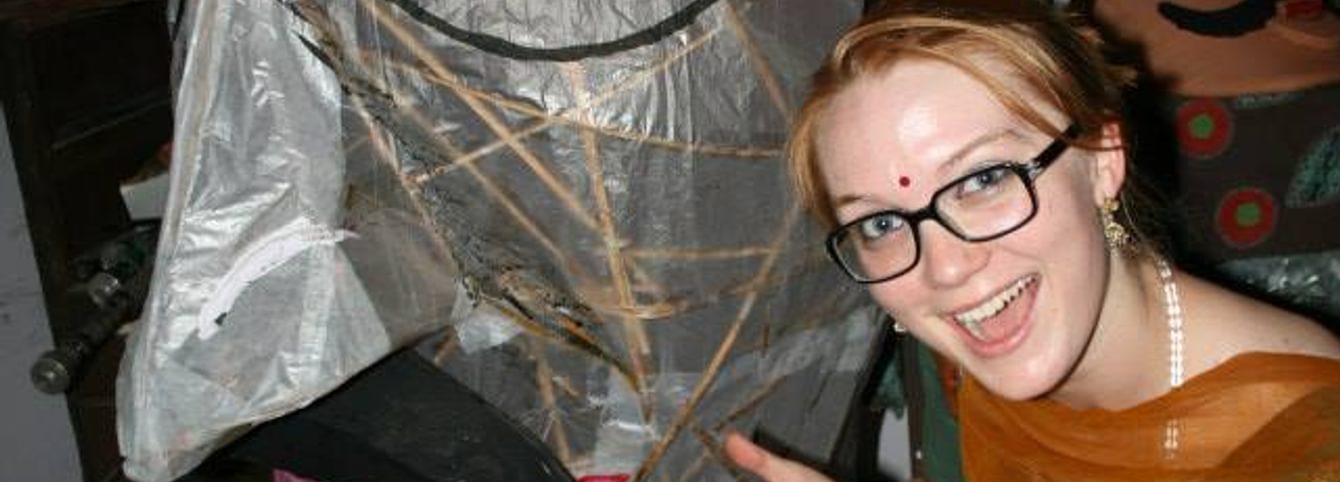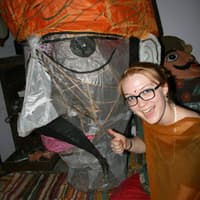Kate Wallner
How did you find out about the CLS Program?
I heard about CLS from a former University of Wisconsin – Madison student. At the time we met I was studying in India, and the she had just finished her summer learning Hindi in Jaipur. She enthusiastically explained the CLS Program to me, and I thought it sounded like a great opportunity to continue learning language and living in India.
Why did you want to study your CLS target language?
Actually, I was first drawn to India itself. Ever since taking my high school AP World History class, I was amazed by Indian culture. I thought the art was so beautiful, the religious tradition so vast, the philosophy so fascinating. I knew I had to experience India first-hand, so when I started college I applied for the College Year in India Program in Varanasi, Uttar Pradesh. The year-long participants were required to know a year's worth of Hindi before traveling to Varanasi, so I enrolled in my university's intensive South Asia Summer Language Institute. Quickly I realized the rich history and complexity of the Hindi language. I began learning Hindi so I could go to India, and I've been hooked on it ever since.
What are your educational and/or professional goals?
Ultimately my goal is to become a professor of religious philosophy, bringing in my experiences and knowledge of ancient Indian philosophy. Specifically I want to study aesthetics and Rasa theory. However, before that I plan on traveling and volunteering with the Peace Corps, hopefully in Nepal (and learn Nepali).
How do you plan to use your target language in the future?
I plan on using Hindi as much and as often as possible. There's no doubt in my mind that I will travel back to India to visit friends and family, so I'll continue using Hindi conversationally. Otherwise, in graduate school I'll be using Hindi and other South Asian languages to better understand Indian philosophical texts.
How did participation in the CLS Program affect your life?
The CLS Program helped me to believe in myself. That may sound cheesy, but when you're learning a language 20+ hours a week, you can get pretty exhausted and want to give up. Motivation is sometimes lost because the class work and culture adjustment can get overwhelmingly daunting. Still, the other students, instructors, and administrators were so encouraging. Even though at times I thought my courses were too difficult for me, the people around me were all feeling similar feelings of frustration because, simply put, learning a foreign language is not easy. You're challenged to think in ways you never did before, understand perspectives you've never seen before -- and it is awesome. It is completely worth the struggle. Our group grew together, learned from each other, and assured one another that we could improve our language skills, despite the heat of Jaipur's summer.
What was your favorite part about studying in your host country?
Though at times it was stressful, my favorite part about studying in India was that I was surrounded by Hindi. There's really no better way to learn a language than to dive right into it. Hindi was on the radio, around the marketplace, written on walls and signs, and one of the best feelings is when you realize you understand it. It doesn't matter if you understand everything or only a little, you understand more than you did before and that's the main point. Every day there were victories with my language learning, whether it was the first time I understood a Hindi rhyme sung by my little host sister, or the first time I could speak Hindi well in our debate class. Though I knew there's still a lot to learn, I felt increasingly comfortable with my Hindi, which made me feel more confident about traveling and living in a foreign place. Language immersion helps you feel that confidence faster and stronger than ever.
Please share a short story about your CLS Program experience.
There are so many meaningful memories, but one that sticks out to me the most is the relationship I developed with my peer tutor. At first I was a bit concerned that she was a few years younger than me, and I didn't know if we would be able to relate on things. I quickly realized that we had so much to talk about – school, family life, women's issues, politics, anything. We were comfortable enough that we wouldn't get angry if we disagreed, and most importantly we could joke with one another. I would write down new Hindi words in my notebook all the time, and she would tease me when I would still have issues remembering the word. At the same time, she was never patronizing. In fact, during the last few weeks of the program, she told me after one of our meetings that my Hindi was so much clearer and quicker than it was in the beginning of the program. She encouraged me constantly. We became true friends, to the point where we made a promise that when she gets engaged, I will be at her wedding, and if I ever get engaged, she is invited to mine as well.
What is your favorite target language word or phrase, and what does it mean in English?
Mujhe tumhari yaad aatii hai.
"To me your memory comes," or in other words, "I miss you."
Hindi tends to be a rather indirect language. For example, instead of a person being late, in Hindi lateness happens to the person, assigning the person a less responsible role. I find this indirectness interesting, but in the case of missing someone or something, indirect language seems especially lovely.
Missing someone or something is not always a conscious occurrence. Sometimes we slowly realize that we miss something, and that though we are not missing actively, there is still a quiet, ever-present missing-sensation. It's not necessarily a negative emotion, it's just that we are appreciating and remembering something we enjoy. It's almost as if the memory of something is floating into the speaker's mind, hovering there, reminding the speaker of good times and good people. I think this Hindi phrase captures these nuances in a very sweet and poetic way.
Personal background
I was born and raised in Ashland, a small northern Wisconsin town of about 8,000 people. It's a beautiful place just on the shore of Lake Superior. I feel very fortunate to have grown up there, I love its local businesses, farms, theatres, and most importantly its friendly community. As a small town, however, there weren't many resources for foreign language learning, but I was lucky enough to get those experiences later in college.
Painting, writing, reading, singing, dancing, and drawing are some of my passions. I'm interested in traveling, learning more languages such as Turkish and Serbo-Croatian, and trying to become a better cook. Though I've graduated and am now working, I still sit in on classes at my alma mater, and I take part in language clubs on campus. I also enjoy volunteering at grade schools where I can help young students get excited about reading.
My last living grandparent is from Croatia and still understands the language. Sadly, she was bullied for not speaking English, which discouraged her from passing Croatian on to her children. My mother was a nurse at a small clinic and my father was an operating engineer doing road construction around the upper Midwest. Though we never did much traveling when we were younger, my two siblings and I have been able to live in different parts of Asia due to study abroad or work opportunities. Our parents wonder at how we all have the urge to learn languages and travel when they are content to be in the northland of Wisconsin. We're all spread throughout the United States now, but we continue supporting each other and we always go back home to visit for as long as we can.



